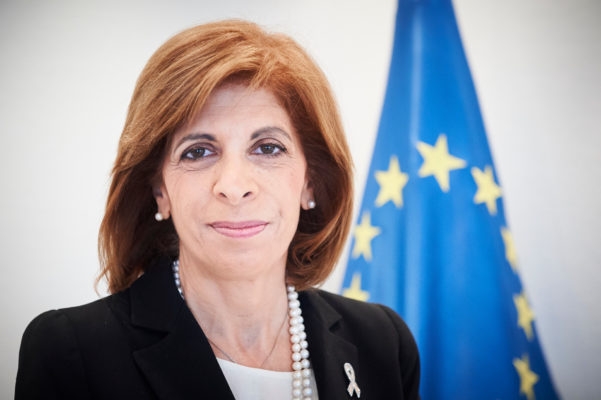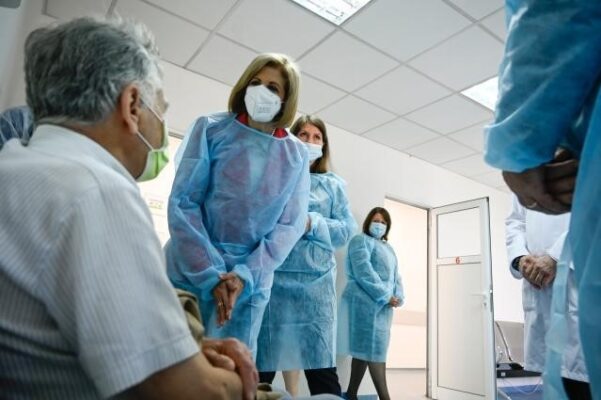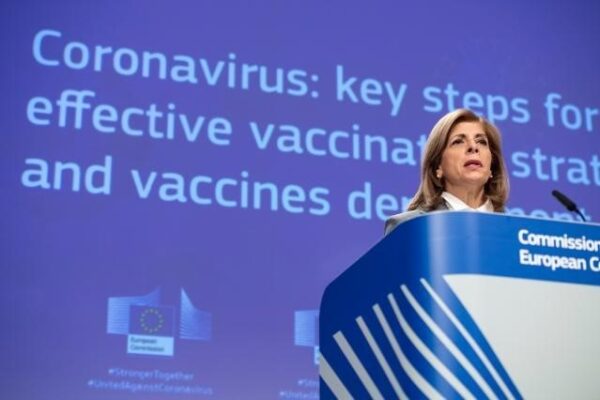What a difference a year makes. In the autumn of 2020, with COVID-19 cases rising and no vaccines yet approved, Europe braced for a bleak winter. Then, in the darkest days of December, the first vaccines were delivered across the continent and early signs of hope emerged.
It was far from a smooth ride: vaccines took time to produce and distribute, putting pressure on EU policymakers throughout the spring. Today, with more than 75% of adults fully vaccinated, the picture looks much different.
We asked Stella Kyriakides, European Commissioner for Health, for her reflections on how the COVID-19 vaccination drive and how it might change EU health policy for good.

Vaccines Today: The EU’s COVID-19 vaccination programmes got off to a slow start. How do you reflect on the European Commission’s role?
Commissioner Kyriakides: The EU Vaccines Strategy has been a tangible success. Whilst the start was indeed slower than we had planned for due to production bottlenecks, the speed of vaccination campaigns picked up quickly, and with over 75% of adults fully vaccinated, the EU is now one of the most vaccinated regions in the world.
Thanks to this unprecedented and coordinated EU effort, we have purchased, distributed and administered safe and effective vaccines to our citizens – equally, fairly and simultaneously – for everyone.
We have built a diversified portfolio of safe and effective vaccines of over 4 billion doses for EU citizens and citizens across the world. More than 800 million COVID-19 vaccine doses have been delivered to Member States so far, allowing for the full vaccination of over 290 million EU citizens.
With this we fulfilled our promise to vaccinate 70% of the EU adult population against COVID-19 by the end of the summer.
Vaccines Today: What does it mean for the EU’s future role in immunisation?
The EU Vaccines Strategy is one of the most telling examples of what we can achieve, the EU institutions and Member States, when we work together in the area of health. It is when we join forces that we can better support our Member States and citizens globally.
In addition, it was never EU first or EU only. This is why we have exported half our industrial production – more than 800 million doses – to third countries. We have committed to donate over 500 million doses by the middle of 2022 and also why we have contributed over €3 billion for the COVAX Facility to ensure that people in all corners of the world get access to COVID-19 vaccines.
I would say that the EU Vaccine Strategy is a blueprint for our future cooperation on health and a model that will inspire our future actions to improve our preparedness and crisis response with the new Health Emergency Preparedness and Response Authority, HERA.

Vaccines Today: Vaccine uptake varies widely across Europe ‒ uptake in adults is above 90% in some countries and as low as 25% in others. What can the EU or national governments do to share experience of what works?
Vaccination rates indeed vary greatly within the EU and that is a cause for concern. Unfortunately, real-world data shows us that low vaccination rates translate to full intensive care units and occupied hospital beds. It is a fact that the high majority of patients in intensive care are unvaccinated.
This is not only a risk for the countries concerned, but for the EU as a whole, as it leaves the potential for even more contagious and severe variants to emerge. Clearly, this is a worrying issue that we need to urgently address.
Vaccination policy is a prerogative of the Member States. But for us, it has always been a priority to provide citizens with the strongest possible scientific evidence, and to communicate in clear terms about the benefits of vaccination.
Vaccines Today: What do you say to those who are yet to be vaccinated against COVID-19?
To those hesitating or questioning, we need to explain that the science is clear: Vaccination against COVID-19 offers the best protection against infection, severe disease, loss of life and long term consequences of COVID-19. It is the most effective way to end the pandemic and get back to a normal life.
I have also travelled to a number of EU countries to see the situation on the ground, and talked with Ministers, scientists and citizens directly. When it comes to vaccination, we know that barriers are often local and context-specific and need to be addressed as such.
Vaccines Today: Social media has played a role in driving vaccine acceptance, but also in spreading misinformation. How can the EU support the sharing of high-quality information?
The circulation of false and misleading information about vaccination is not a new challenge. However, you are right that COVID-19 has exacerbated this issue and put it back at the top of the political agenda. This is why the Commission prepared an information campaign around Safe COVID-19 vaccines for Europeans to provide citizen-friendly explanations and educational material about the processes behind the development and authorisation of vaccines in Europe.
For us it is crucial that citizens understand the role and importance of vaccination and that all vaccines used are safe and efficient. The safety of our citizens always comes first, we would never authorise the use of any medicinal products in the EU unless rigorously assessed and evaluated.
It is essential that we can work with the most trusted people in local communities, for example frontline healthcare professionals, patient organisations and community and religious leaders. These are the people many of our citizens are in contact with and trust the most.

Social media companies have a key role to play as gatekeepers here. We are working with them and we are closely monitoring the actions under the Code of Practice on Disinformation ‒ the self-regulatory commitment of online platforms, leading social networks, advertisers and the advertising industry to address the spread of online disinformation. In the future, we expect stronger commitment by the signatories and foresee a broader Code participation.
A stronger commitment includes reducing the financial incentives for disinformation, empowering users to take an active role in preventing its spread and cooperating with fact-checkers across EU Member States, whilst providing a framework for data access.
Online platforms are key players and must be partners in this work.
Vaccines Today: What can be done to get routine immunisation back on track?
Whilst the pandemic has caused delays in treatments and routine vaccination, which is a cause of concern, there are also signs of scope for future positive developments. The latest data on vaccine confidence suggests that there are knock-on effects of the wide information campaign around COVID-19 vaccination. We need to use this momentum and ensure that access to vaccination does not play a barrier.
Throughout the pandemic, the EU has stood alongside Member States in providing support in order to ensure that essential services such as cancer screening remained operational, albeit at a reduced capacity.
With Europe’s Beating Cancer Plan, we have pledged to support Member States’ efforts to extend routine vaccination against human papillomaviruses of girls and boys – in order to eliminate cervical cancer and other cancers caused by human papillomaviruses.
Here, our objective is to vaccinate at least 90% of the EU target population of girls and to significantly increase the vaccination of boys by 2030. Cooperation with Member States will play a critical role in meeting this target, and generally making sure that routine immunisation gets back on track.
Vaccines Today: Has the Commission’s vaccination roadmap (2019-2022) been derailed by the COVID-19 crisis?
Despite the pandemic, the EU vaccination roadmap is on track. For example, the European Vaccination Information Portal is live and has proven to be an essential resource during the pandemic.
Already in 2019, a Global Vaccination Summit was organised, and the establishment of the Coalition for Vaccination is also a successful action from the roadmap. And several projects to increase vaccination coverage in disadvantaged and difficult to reach populations have been launched to date.
I expect vaccination generally to remain high on political agendas as well as in our work over the coming years.




